- Home
- Howard Pyle
The Merry Adventures of Robin Hood Page 10
The Merry Adventures of Robin Hood Read online
Page 10
Then Little John laughed aloud. “Good Master Sheriff,” said he, “thou dost indeed know me, and I am Little John. But let me tell thee, all this would not have happened had not thy beggarly Steward starved me, and had he given me food to eat when I asked it. But if he gave none to me, the green hart will give thee another feast, and when thou goest back, tell thy Steward the time will come when he and I shall have a reckoning.”
In the mean time Robin Hood had come to them. “Now welcome, Master Sheriff,” said he. “Hast thou come to-day to take another feast with me?”
“Nay, heaven forbid!” said the Sheriff, in tones of deep earnest. “I care for no feast and have no hunger to-day.”
“Nevertheless,” quoth Robin, “if thou hast no hunger, maybe thou hast thirst, and well I know thou wilt take a cup of sack with me. But I am grieved that thou wilt not feast with me, for thou couldst have victuals to thy liking, for there stands thy Cook.”
Then he led the Sheriff, will-he-nill-he, to the seat he knew so well beneath the greenwood tree.
“Ho, lads!” cried Robin, “fill our good friend, the Sheriff, a right brimming cup of sack and fetch it hither, for he is faint and weary.”
Then one of the band brought the Sheriff a cup of sack, bowing low as he handed it to him; but the Sheriff could not touch the wine, for he saw it served in one of his own silver flagons, on one of his own silver plates.
“How now,” quoth Robin, “dost thou not like our new silver service? We have gotten a bag of it this day.” So saying, he held up the sack of silver that Little John and the Cook had brought with them.
Then the Sheriffs heart was bitter within him; but, not daring to say anything, he only gazed upon the ground. Robin looked keenly at him for a time before he spoke again; then said he, “Now, Master Sheriff, the last time thou camest to Sherwood Forest thou didst come seeking to despoil a poor spendthrift, and thou wert despoiled thine own self; but now thou comest seeking to do no harm, nor do I know that thou hast despoiled any man. I take my tithes from fat priests and lordly squires, to help those that they despoil and to raise up those that they bow down; but I know not that thou hast tenants of thine own whom thou hast wronged in any way. Therefore, take thou thine own again, nor will I dispossess thee to-day of so much as one farthing. Come with me, and I will lead thee from the forest back to thine own party again.”
Then, slinging the bag upon his shoulder, he turned away, the Sheriff following him, all too perplexed in mind to speak. So they went forward until they came to within a furlong of the spot where the Sheriffs companions were waiting for him. Then Robin Hood gave the sack of silver back to the Sheriff. “Take thou thine own again,” he said, “and, hearken to me, good Sheriff, take thou a piece of advice with it. Try thy servants well ere thou dost engage them again so readily.” Then, turning, he left the other standing bewildered, with the sack in his hands.
The company that waited for the Sheriff were all amazed to see him come out of the forest bearing a heavy sack upon his shoulders; but though they questioned him, he answered never a word, acting like one who walks in a dream. Without a word, he placed the bag across his nag’s back, and then, mounting, rode away, all following him; but all the time there was a great turmoil of thoughts within his head, tumbling one over the other. And thus ends the merry tale of Little John and how he entered the Sheriffs service.
PART THIRD.
Recounting three merry adventures that befel Robin Hood and certain others, by which he gained sore bones and three good merry men, all in one day.
I.
Little John and the Tanner of Blyth.
IT often comes about in this world that unlucky happenings fall upon one in such measure that it seems, as the saying is, that every cat that one strokes flies into one’s face. Thus it was with Robin Hood and Little John one bright day in the merry Maytime; so listen and you shall hear how Dame Luck so buffeted them that their bones were sore for many a day thereafter.
One fine day, not long after Little John had left abiding with the Sheriff and had come back, with his worship’s cook, to the merry greenwood, as has just been told, Robin Hood and a few chosen fellows of his band lay upon the soft sward beneath the greenwood tree where they dwelt. The day was warm and sultry, so that whilst most of the band were scattered through the forest upon this mission and upon that, these few stout fellows lay lazily beneath the shade of the tree, in the soft afternoon, passing jests among themselves and telling merry stories, with laughter and mirth.
All the air was laden with the bitter fragrance of the May, and all the bosky shades of the woodlands beyond rang with the sweet song of birds,—the throstle-cock, the cuckoo, and the wood-pigeon,—and with the song of birds mingled the cool sound of the gurgling brook that leaped out of the forest shades, and ran fretting amid its rough, gray stones across the sunlit open glade before the trysting-tree. And a fair sight was that halfscore of tall, stout yeomen, all clad in Lincoln green, lying beneath the broad-spreading branches of the great oak tree, amid the quivering leaves of which the sunlight shivered and fell in dancing patches upon the grass.
The good old times have gone by when such men grow as grew then; when sturdy quarterstaff and long bow toughened a man’s thews till they were like leather. Around Robin Hood that day there lay the very flower of English yeomanrie. Here the great Little John, with limbs as tough as the gnarled oak, yet grown somewhat soft from good living at the Sheriffs house in Nottingham Town; there Will Stutely, his face as brown as a berry from sun and wind, but, for all that, the comeliest yeoman in the midcountry, only excepting Allan a Dale, the minstrel, of whom you shall hear anon. Beside these was Will Scathelock, as lank as a greyhound, yet as fleet of foot as a buck of three years’ growth; young David of Doncaster, with great stout limbs only less than those of Little John in size, the tender beard of early youth now just feathering his chin, and others of great renown both far and near.
Suddenly Robin Hood smote his knee.
“By Saint Dunstan,” quoth he, “I had nigh forgot that quarter-day cometh on apace, and yet no cloth of Lincoln green in all our store. It must be looked to, and that in quick season. Come, busk thee, Little John! stir those lazy bones of thine, for thou must get thee straightway to our good gossip, the draper, Hugh Longshanks of Ancaster. Bid him send us straightway twentyscore yards of fair cloth of Lincoln green; and mayhap the journey may take some of the fat from off thy bones, that thou hast gotten from lazy living at our dear Sheriff’s.”
Robin Hood mocks Little John because of his fatness.
“Nay,” muttered Little John (for he had heard so much upon this score that he was sore upon the point), “nay, truly, mayhap I have more flesh upon my joints than I once had, yet, flesh or no flesh, I doubt not that I could still hold my place and footing upon a narrow bridge against e’er a yeoman in Sherwood, or Nottinghamshire, for the matter of that, even though he had no more fat about his bones than thou hast, good master.”
Little John is galled, and answers Robin to some purpose.
At this reply a great shout of laughter went up, and all looked at Robin Hood, for each man knew that Little John spake of a certain fight that happened between their master and himself, through which they first became acquainted.
“Nay,” quoth Robin Hood, laughing louder than all, “Heaven forbid that I should doubt thee, for I care for no taste of thy staff myself, Little John. I must needs own that there are those of my band can handle a seven-foot staff more deftly than I; yet no man in all Nottinghamshire can draw gray-goose shaft with my fingers. Nevertheless, a journey to Ancaster may not be ill for thee; so go thou, as I bid, and thou hadst best go this very evening, for since thou hast abided at the Sheriffs many know thy face, and if thou goest in broad daylight, thou mayst get thyself into a coil with some of his worship’s men-at-arms. Bide thou here till I bring thee money to pay our good Hugh. I warrant he hath no better customers in all Nottinghamshire than we.“ So saying, Robin left them and entered the forest.
Robin bids Little John go upon a mission to the Draper of Ancaster.
Not far from the trysting tree was a great rock in which a chamber had been hewn, the entrance being barred by a massive oaken door two palms’ breadth in thickness, studded about with spikes, and fastened with a great padlock. This was the treasure-house of the band, and thither Robin Hood went, and, unlocking the door, entered the chamber, from which he brought forth a bag of gold, which he gave to Little John, to pay Hugh Longshanks withal, for the cloth of Lincoln green.
Then up got Little John, and, taking the bag of gold, which he thrust into his bosom, he strapped a girdle about his loins, took a stout pikestaff full seven feet long in his hand, and set forth upon his journey.
Little John sets forth to Ancaster.
So he strode whistling along the leafy forest path that led to Fosse Way, turning neither to the right hand nor the left, until at last he came to where the path branched, leading on the one hand onward to Fosse Way, and on the other, as well Little John knew, to the merry Blue Boar Inn. Here Little John suddenly ceased whistling, and stopped in the middle of the path. First he looked up and then he looked down, and then, tilting his cap over one eye, he slowly scratched the back part of his head. For thus it was: at the sight of these two roads, two voices began to alarum within him, that one crying, “There lies the road to the Blue Boar Inn, a can of brown October, and a merry night with sweet companions such as thou mayst find there;” the other, “There lies the way to Ancaster and the duty thou art sent upon.” Now the first of these two voices was far the louder, for Little John had grown passing fond of good living through abiding at the Sheriffs house; so, presently, looking up into the blue sky, across which bright clouds were sailing like silver boats, and swallows skimming in circling flight, quoth he, “I fear me it will rain this evening, so I’ll e’en stop at the Blue Boar till it passes by, for I know my good master would not have me wet to the skin.” So, without more ado, off he strode down the path that lay the way of his likings. Now there was no sign of any foul weather, but when one wishes to do a thing, as Little John did, one finds no lack of reasons for the doing.
Little John leaves his duty and the road to Ancaster, and turns to the Blue Boar Inn.
Four merry wags were at the Blue Boar Inn; a butcher, a beggar, and two barefoot friars. Little John heard them singing from afar, as he walked through the hush of the mellow twilight that was now falling over hill and dale. Right glad were they to welcome such a merry blade as Little John. Fresh cans of ale were brought, and with jest and song and merry tales the hours slipped away on fleeting wings. None thought of time or tide till the night was so far gone that Little John put by the thought of setting forth upon his journey again that night, and so bided at the Blue Boar Inn until the morrow.
Little John abides at the Blue Boar Inn all night.
Now it was an ill piece of luck for Little John that he left his duty for his pleasure, and he paid a great score for it, as we are all apt to do in the same case, as you shall see.
Up he rose at the dawn of the next day, and, taking his stout pikestaff in his hand, he set forth upon his journey once more, as though he would make up for lost time.
In the good town of Blyth there lived a stout tanner, celebrated far and near for feats of strength and many tough bouts at wrestling and the quarterstaff. For five years he had held the midcountry champion belt for wrestling, till the great Adam o’ Lincoln cast him in the ring and broke one of his ribs; but at quarterstaff he had never yet met his match in all the country about. Beside all this, he dearly loved the long bow, and a sly jaunt in the forest when the moon was full and the dun deer in season; so that the King’s rangers kept a shrewd eye upon him and his doings, for Arthur a Bland’s house was apt to have a plenty of meat in it that was more like venison than the law allowed.
Now Arthur had been to Nottingham Town the day before Little John set forth on his errand, there to sell a halfscore of tanned cowhides. At the dawn of the same day that Little John left the inn, he started from Nottingham, homeward for Blyth. His way led, all in the dewy morn, past the verge of Sherwood Forest, where the birds were welcoming the lovely day with a great and merry jubilee. Across the Tanner’s shoulders was slung his stout quarterstaff, ever near enough to him to be gripped quickly, and on his head was a cap of doubled cowhide, so tough that it could hardly be cloven even by a broadsword.
Arthur a Bland sets forth from Nottingham Town for Blyth.
“Now,” quoth Arthur a Bland to himself, when he had come to that part of the road that cut through a corner of the forest, “no doubt at this time of year the dun deer are coming from the forest depths nigher to the open meadow lands. Mayhap I may chance to catch a sight of the dainty brown darlings thus early in the morn.” For there was nothing he loved better than to look upon a tripping herd of deer, even when he could not tickle their ribs with a clothyard shaft. Accordingly, quitting the path, he went peeping this way and that through the underbrush, spying now here and now there, with all the wiles of a master of woodcraft, and of one who had more than once donned a doublet of Lincoln green.
He thinks to catch a sight of the dun deer.
Now as Little John stepped blithely along, thinking of nothing but of such things as the sweetness of the hawthorn buds that bedecked the hedgerows, or the crab-trees that stood here and there all covered with fair pink blossoms, or gazing upward at the lark, that, springing from the dewy grass, hung aloft on quivering wings in the yellow sunlight, pouring forth its song that fell like a falling star from the sky, his luck led him away from the highway, not far from the spot where Arthur a Bland was peeping this way and that through the leaves of the thickets. Hearing a rustling of the branches, Little John stopped, and presently caught sight of the brown cowhide cap of the Tanner moving amongst the bushes.
Little John seeth Arthur a Bland in the thickets.
“I do much wonder,” quoth Little John to himself, “what yon knave is after, that he should go thus peeping and peering about. I verily believe that yon scurvy varlet is no better than a thief, and cometh here after our own and the good King’s dun deer.” For by much roving in the forest, Little John had come to look upon all the deer in Sherwood as belonging to Robin Hood and his band as much as to good King Harry. “Nay,” quoth he again, after a time, “this matter must e’en be looked into.” So, quitting the high-road, he also entered the thickets, and began spying around after stout Arthur a Bland.
So for a long time they both of them went hunting about, Little John after the Tanner, and the Tanner after the deer. At last Little John trod upon a stick, which snapped under his foot, whereupon, hearing the noise, the Tanner turned quickly and caught sight of the yeoman. Seeing that the Tanner had spied him out, Little John put a bold face upon the matter.
“Hilloa,” quoth he, “what art thou doing here, thou naughty fellow? Who art thou that comest ranging Sherwood’s paths? In very sooth thou hast an evil cast of countenance, and I do think, truly, that thou art no better than a thief, and comest after our good King’s deer.”
Little John biddeth Arthur a Bland to stand.
“Nay,” quoth the Tanner boldly,—for, though taken by surprise, he was not a man to be frightened by big words,—“thou liest in thy teeth. I am no thief, but an honest craftsman. As for my countenance, it is what it is; and, for the matter of that, thine own is none too pretty, thou saucy fellow.”
“Ha!” quoth Little John, in a great loud voice, “wouldst thou give me back-talk? Now I have a great part of a mind to crack thy pate for thee. I would have thee know, fellow, that I am, as it were, one of the King’s foresters. Leastwise,” muttered he to himself, “I and my friends do take good care of our good sovereign’s deer.”
“I care not who thou art,” answered the bold Tanner, “and unless thou hast many more of thy kind by thee, thou canst never make Arthur a Bland cry ‘A mercy.’ ”
Arthur a Bland defies Little John.
“Is it so?” cr
ied Little John, in a rage. “Now, by my faith, thou saucy rogue, thy tongue hath led thee into a pit thou wilt have a sorry time getting out of; for I will give thee such a drubbing as ne’er has thou had in all thy life before. Take thy staff in thy hand, fellow, for I will not smite an unarmed man.”
“Marry come up with a murrain!” cried the Tanner, for he, too, had talked himself into a fume. “Big words ne‘er killed so much as a mouse. Who art thou that talkest so freely of cracking the head of Arthur a Bland? If I do not tan thy hide this day as ne’er I tanned a calfs hide in all my life before, split my staff into skewers for lamb’s flesh and call me no more brave man! Now look to thyself, fellow!”
“Stay!” said Little John; “let us first measure our cudgels. I do reckon my staff longer than thine, and I would not take vantage of thee by even so much as an inch.”
“Nay, I pass not for length,” answered the Tanner. “My staff is long enough to knock down a calf; so look to thyself, fellow, I say again.”
So, without more ado, each gripped his staff in the middle, and, with fell and angry looks, they came slowly together.
Little John and Arthur a Bland make ready to fight.
Robin Hood sets forth to meet Little John at the Blue Boar Inn, to chide him.
Now news had been brought to Robin Hood how that Little John, instead of doing his bidding, had passed by duty for pleasure, and so had stopped overnight with merry company at the Blue Boar Inn, instead of going straight to Ancaster. So, being vexed to his heart by this, he set forth at dawn of day to seek Little John at the Blue Boar, or at least to meet the yeoman on the way, and ease his heart of what he thought of the matter. As thus he strode along in anger, putting together the words he would use to chide Little John, he heard, of a sudden, loud and angry voices, as of men in a rage, passing fell words back and forth from one to the other. At this, Robin Hood stopped and listened. “Surely,” quoth he to himself, “that is Little John’s voice, and he is talking in anger also. Methinks the other is strange to my ears. Now Heaven forfend that my good trusty Little John should have fallen into the hands of the King’s rangers. I must see to this matter, and that quickly.”

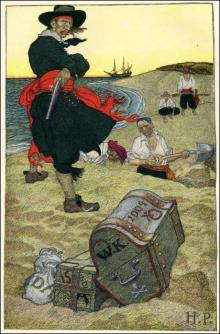 Howard Pyle's Book of Pirates
Howard Pyle's Book of Pirates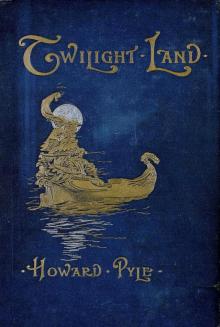 Twilight Land
Twilight Land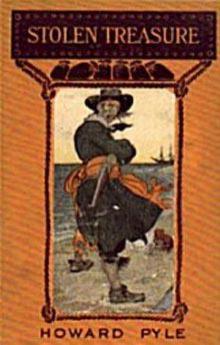 Stolen Treasure
Stolen Treasure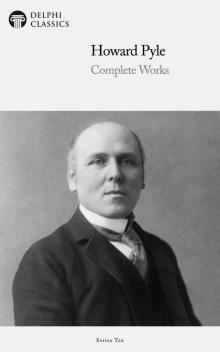 Complete Works of Howard Pyle
Complete Works of Howard Pyle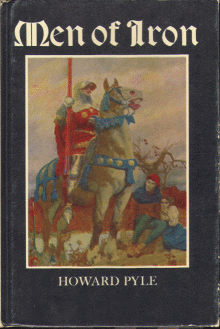 Men of Iron
Men of Iron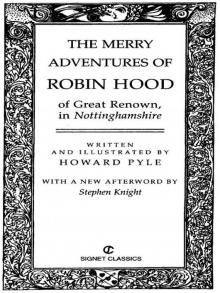 The Merry Adventures of Robin Hood
The Merry Adventures of Robin Hood The Wonder Clock
The Wonder Clock